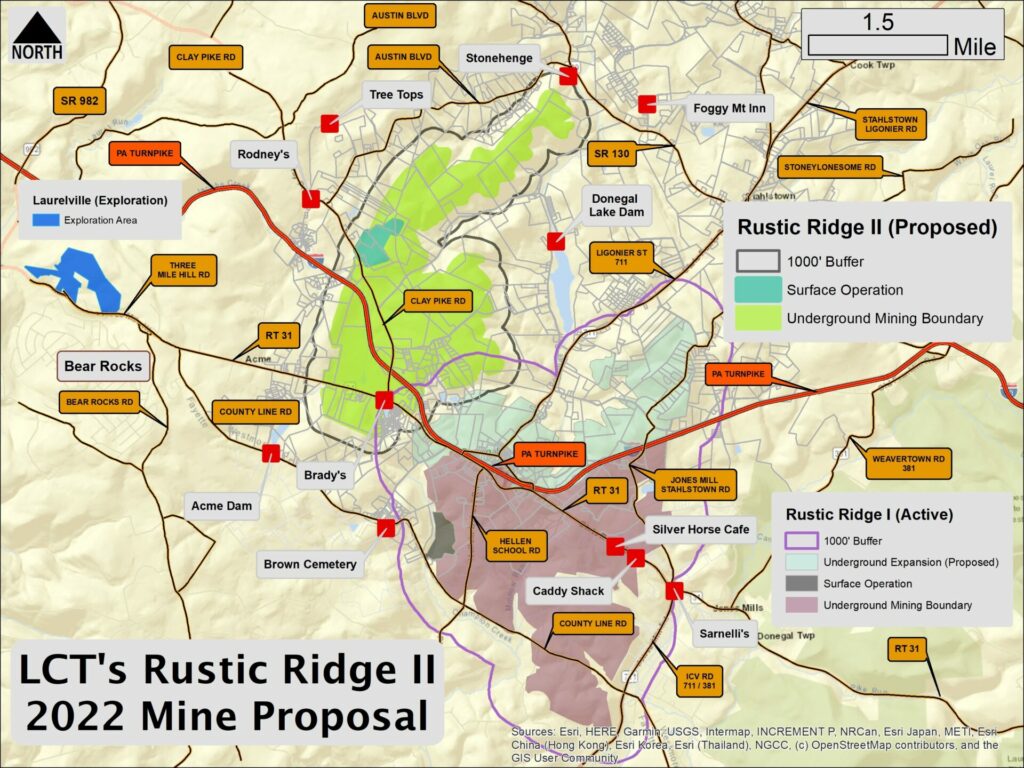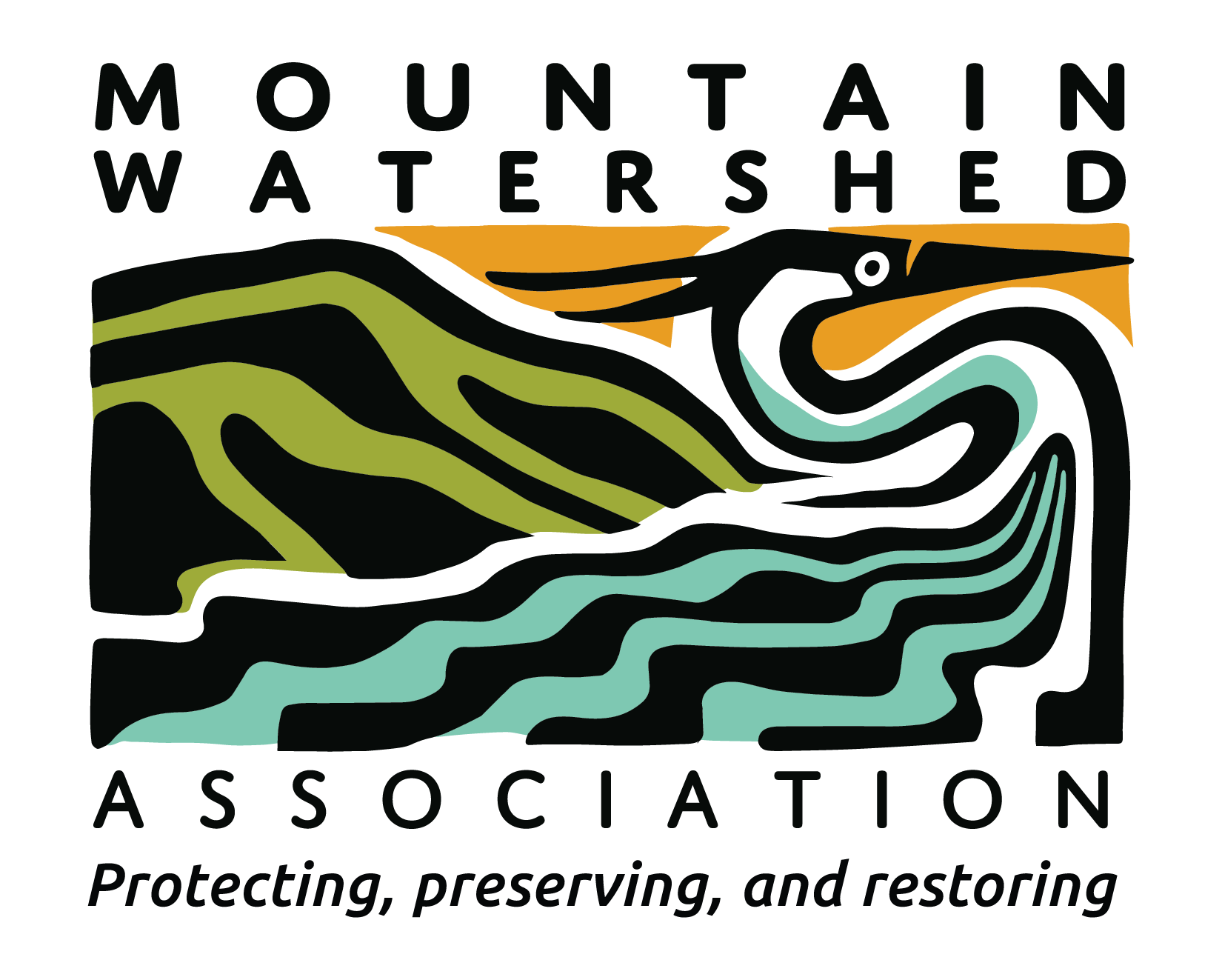Over the last decade, the Laurel Highlands has witnessed continued efforts by industry to expand resource extraction in the region. Coal, a resource that experiences “boom and bust” cycles in national and international markets, was once thought to be heading out the door in the region, as many coal companies went bankrupt and left town. As the shale gas revolution began in the 2010’s, many extractive industries shifted their focus from coal to shale gas. The Laurel Highlands, in particular, has experienced a significant amount of shale gas development due to the Marcellus Shale underlying the region. However, much of the remaining coal in the Laurel Highlands region is metallurgical grade, which is used in industrial processes such as steel production. As a result, active coal mining development continues to occur right in our backyards, with expansive areas of homes, roads, and local businesses being undermined.
In the triple divide area of Jacobs Creek, Indian Creek, and Loyalhanna headwaters, there are currently approximately 9,000-acres of land being explored and exploited for active and proposed coal mining operations. Off of County Line Road in Westmoreland and Fayette counties, LCT Energy operates the Rustic Ridge Deep Mine. The Rustic Ridge Mine is a room and pillar underground mine that produces metallurgical coal. It has been associated with causing negative impacts to private water supplies, subsidence of local homes, and substantial quality of life changes – such as the truck traffic that has taken over the Donegal and Acme areas. In addition to the currently operating mine, which is up for renewal with the DEP, LCT is proposing a 1,400-acre expansion to that mine, a new 2,600-acre mine off of Claypike Road, and various explorations for potential mining projects in and around Donegal.

The Laurel Highlands are known as one of the top tourism destinations in Pennsylvania, with people traveling from far and wide to see the scenic beauty and engage in the outdoor recreation opportunities that the region has to offer. Not to mention, it is a beautiful, peaceful, rural place to live. Concerned residents have been fighting LCT and its various mining operations since the initial Rustic Ridge Mine was first proposed. Some individuals have spent 15+ years trying to protect the mountains and waterways that they love and rely on.
Residents feel as though their concerns, when expressed to the Pennsylvania Department of Environmental Protection (“DEP”), are going unheard. This is bolstered by the fact that the PA DEP has failed to adequately communicate with residents about concerns on a timeline set by their own internal regulations. An agency that is supposed to work to benefit the people and their environment has left the people feeling inadequately represented. Moreover, many of these citizens follow all of the procedures outlined by the DEP when problems arise – yet their problems are still not addressed. Specific examples of these instances include:
- Impacted and concerned residents have issued very specific comments to DEP during Public Comment periods. The DEP failed to respond directly to their questions and never followed up.
- Specific questions regarding a cluster of damaging subsidence claims were deferred from a regional office to the Mine Safety office. When follow up occurred, Mine Safety deferred the question back to the originally contacted regional office.
- When surveys required under DEP regulations were conducted in a manner that residents felt were insufficient, DEP failed to respond to resident concerns.
- The DEP continually responds to concerned residents’ questions and complaints with references to the regulations, without explaining or giving context to how they are relevant.
- Residents were instructed to provide certain materials to the DEP during a public participation opportunity. DEP informed residents one hour prior to the meeting that the materials were not accessible, despite residents forming their comments based on the materials.
Another example of the poor communication DEP has with Pennsylvania residents is evidenced by the response issued by DEP to the two Informal Public Conferences (IPCs) held in 2022. Per DEP’s own regulations, attendees of the IPC should receive a response within 60 days. The response to the first IPC came 210 days later, and the response to the second IPC came 341 days later. In addition to the delay in responses to the IPC, DEP also acknowledged in the IPC response documents that they still had not received a copy of the engineering report that LCT based their revised mining plan off of. This is unacceptable and DEP should be demanding to see the report.
Given the lack of accountability in the relationship between concerned residents and the DEP, it is improper and unconscionable for the DEP to permit any further mining in the Laurel Highlands region. We ask that you please join concerned residents and the Mountain Watershed Association in demanding that the DEP do better by signing on to the attached letter. Local residents and MWA staff will be presenting the letter to DEP higher officials and elected officials in Harrisburg in June 2023.
To sign on to the letter, you can access the following link, which also includes the text of the letter. Please sign on no later than May 26, 2023. Additionally, copies of the letter will be located at the MWA office building, 1414 Indian Creek Valley Road, Melcroft, PA 15462, and physical sign-on sheets will be available there as well. If you have any questions or concerns, please feel free to reach out to Stacey at stacey@mtwatershed.com or Maddie at madison@mtwatershed.com.

